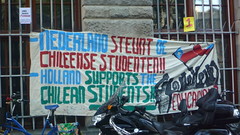
The headlines coming out of Chilé this week echo throughout the world, “government shift in policy regarding learning about Pinochet era in school,” from now on to be described as a “regime”, and not a “dictatorship”. Which is immediately met with anger and disapproval, criticized as an attempt to rewrite and whitewash history.
You don’t have to be Chilean to know something about re-writing history. One constant that transcends borders and time is that history gets told in different ways as time passes. People often refer to the old Churchill quote, “History is written by the victors,” in an effort to explain how the stories from the past are told. Christopher Columbus was an explorer. George Washington, a great leader. Genghis Khan, a brave fighter. None may be true, but each is often told, retold and accepted as fact. Few of the victims are alive or represented to tell a different story, though some brave souls with seek out and bring their histories back to life.
In the context of the classroom and what appears in history books, there is no doubt that these things have tremendous influence as to how children will grow up understanding the world and how it came to be as it is. Chileans have every right to be concerned or outraged when their nation’s history is rewritten in favor of those who committed mass murder and other atrocities. Most nations on this planet have marginalized or harmed people in some way in their past, yet not all are willing to admit it and let the shameful stories be told in the classroom. It is easier to hide behind pride and boastful patriotism, far more difficult to be honest and critical of what your country does and has done in the past.
All outrage aside, in our present world of plentiful information and the informal learning renaissance, citizens could also look to each other to address this problem. At home and in our communities, both offline and online, we have the power to tell history from the bottom-up. The government may shift and attempt ridiculous revisions that might even be implemented for periods of time, but we have a fantastic arsenal of experience and communication to counter such hubris. The children of the world could stand up during the revised history lesson on how charming dictators from the past were, and calmly respond — we know this is false. Better yet, they could rewrite the whole section with help from stories of people who lived through the horror.
 My guest on this edition of Citizenreporter.org is Chilean-American, community organizer, world citizen
My guest on this edition of Citizenreporter.org is Chilean-American, community organizer, world citizen  What is the situaton in Chilé following the massive earthquake that struck late last month? How bad is the damage and how is the recovery effort going? My friend Nick Farr joins us via skype from somewhere in Chilé as he travels through the country observing what is going on. He explains the reality on the ground.
What is the situaton in Chilé following the massive earthquake that struck late last month? How bad is the damage and how is the recovery effort going? My friend Nick Farr joins us via skype from somewhere in Chilé as he travels through the country observing what is going on. He explains the reality on the ground.